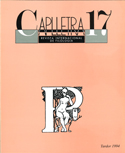La lexicografia bilingüe
DOI:
https://doi.org/10.7203/caplletra.17.7407Paraules clau:
lexicografia, biblingüisme Resum
Resum
A monolingual dictionary offers word definitions. A bilingual dictionary provides equivalences between a source language and a target one. It relates the words in the source language to some sort of definition by synonymy, with a different phonetics.
Can there be wholly satisfactory equivalences between the linguistic units in one language and those in another one? Does this question relate in any sense to the notion of linguistic universal? With respect to denotation, anything that can be expressed in one language can undoubtedly be said in another. The original cultural homogeneity between many languages (for example, the Indoeuropean ones) makes easy for them to syntonize with one another with respect to the universals.
The criteria that are used to choose and provide a hierarchy of lemmas with their different meanings in a monolingual dictionary can be easily applied to bilingual dictionaries. The number of entries usually depends on the greater lexical offer of the source language because of the interest that can raise in the transfer to the target language. However, should any «speech» fact be reflected in a bilingual dictionary?
Users can expect a good bilingual dictionary to offer a large amount of vocabulary, which is usual and genuine in a variety of registers, with a detailed semantic description of every word and a collection of the idiomatisms in which the word is involved. It is also expected that the dictionary user can understand and expression in a particular language and express it in another one without altering their meaning content.
 Descàrregues
Descàrregues
Descàrregues
Com citar
-
Resum441
-
PDF170
Número
Secció
Llicència
L’autor o autora que adrece un treball a la redacció de Caplletra perquè siga publicat ha de ser la persona titular legítima dels drets d'explotació. La legitimació per a la publicació del treball ha d’incloure també les imatges, les taules, els gràfics i altres materials que puguen complementar el text, amb independència de si n'és l'autor o autora.
Copyright. Quan publica el treball en la revista, l'autor o autora cedeix a Caplletra. Revista Internacional de Filologia els drets d'explotació (reproducció, distribució i comunicació pública), tant per a l'edició impresa en paper com per a la versió electrònica, que serà accessible mitjançant la xarxa Internet.
Tots els treballs publicats en Caplletra es troben sota una llicència Creative Commons del tipus Reconeixement-NoComercial-SenseObraDerivada 4.0.
RESPONSABILITAT
Caplletra. Revista Internacional de Filologia no s'identifica necessàriament amb els punts de vista mantinguts en els treballs que publica.
Caplletra. Revista Internacional de Filologia declina tota responsabilitat derivada de qualsevol vulneració eventual dels drets de propietat intel·lectual que poguera ser duta a terme pels autors o autores.






